HOME >> OPINION
South Korea GSOMIA withdrawal defies US foreign strategy
By Chen Yang Source:Global Times Published: 2019/8/27 21:28:50

Photo: IC
South Korea announced on August 22 it will terminate its General Security of Military Information Agreement (GSOMIA) with Japan. According to a Blue House statement, the agreement does not meet Seoul's "national interests."
Japanese Prime Minister Shinzo Abe denounced the decision the next day and said, "Japan will urge South Korea to recover trust between us, including resolving the matter of violation of the international treaty between Japan and South Korea and hope South Korea will keep their promise."
US Secretary of State Mike Pompeo was disappointed with the decision. Although Seoul only announced it would end the agreement, it will impact the stability of Washington-Seoul-Tokyo trilateral relations.
It seems the South Korean government's decision was influenced by the recent Japan-South Korea trade disputes. But such a result had already been foreshadowed when the two sides signed the agreement in 2016. The GSOMIA has been the only military cooperation agreement signed by Japan and South Korea since the two countries normalized ties in 1965.
When allies or countries having close relations exchange confidential military information, a GSOMIA is implemented to prevent security secrets from being leaked to a third country. In other words, having a close relationship is a prerequisite for signing the agreement.
Japan and South Korea were not exactly close in 2016, and the South Korean public opinion was then against the agreement. Yet they inked the pact so the US government could move forward with its Asia-Pacific rebalance strategy.
The announcement from South Korea to end the pact was partly a result of national public opinion. Due to the ongoing trade disputes, anti-Japanese sentiment has increased in South Korea. If the Moon Jae-in administration continues its GSOMIA with Japan, it would create great public opposition and weaken the public support for the cabinet. Besides, Japan and South Korea lack political trust, and signing the GSOMIA was a hasty decision.
Since the end of WWII, there have been constant disputes between Japan and South Korea. But this time, the impact of their disputes is much more significant. During the Junichiro Koizumi administration (2001-2006), Japan-South Korea relations worsened because of Koizumi's statements and actions on historical issues.
There was an uptick in anti-South Korean and anti-Japanese sentiment respectively in Japan and South Korea, but the risks were controllable. Now especially since last week's announcement by Seoul, tension between the two countries has spread from trade to military security, and could move to other areas. This is unprecedented.
On several occasions, the Abe administration had asked South Korea to renew the GSOMIA, but to no avail. There could be a favorable turn in Tokyo-Seoul relations if South Korea continued the agreement. But now, relations may remain to be at a low ebb for some time.
The end of the GSOMIA not only shows that US prestige has declined but also reflects the wavering of US-Japan-South Korea trilateral relations. Before last Thursday, US high-ranking officials had asked South Korea to maintain the overall situation, trying to improve Japan-South Korea ties and protect trilateral stability. However, Seoul still decided to end the agreement. The decision reflects Washington's ability to resolve disputes among allies has weakened.
Japan and South Korea are US allies, yet the two East Asian countries are not allies. Thus, in the trilateral framework, Japan-South Korea relations have always been weak. The US knows it is difficult to force an alliance between Japan and South Korea due to historical and territorial disputes.
Consequently, the US promoted the GSOMIA in 2016 to strengthen the Japan-South Korea relationship and tried to upgrade it to a quasi-alliance, in an attempt to stabilize trilateral relations. But Seoul's recent decision was a blow to trilateral relations and future cooperation.
The signing of the GSOMIA between Japan and South Korea was an attempt to share information on North Korean missiles and other military intelligence, without US transit.
It's an essential component of US foreign policy to interfere with peace and stability throughout East Asia. The possibility that Japan and South Korea would sign a GSOMIA again in the future cannot be excluded. Should that happen, the decision should benefit regional peace and stability and promote the Korean Peninsula peace process, rather than harm the interests of a third party.
The author is an editor at the Global Times and a Japan watcher. opinion@globaltimes.com.cn
Posted in: VIEWPOINT